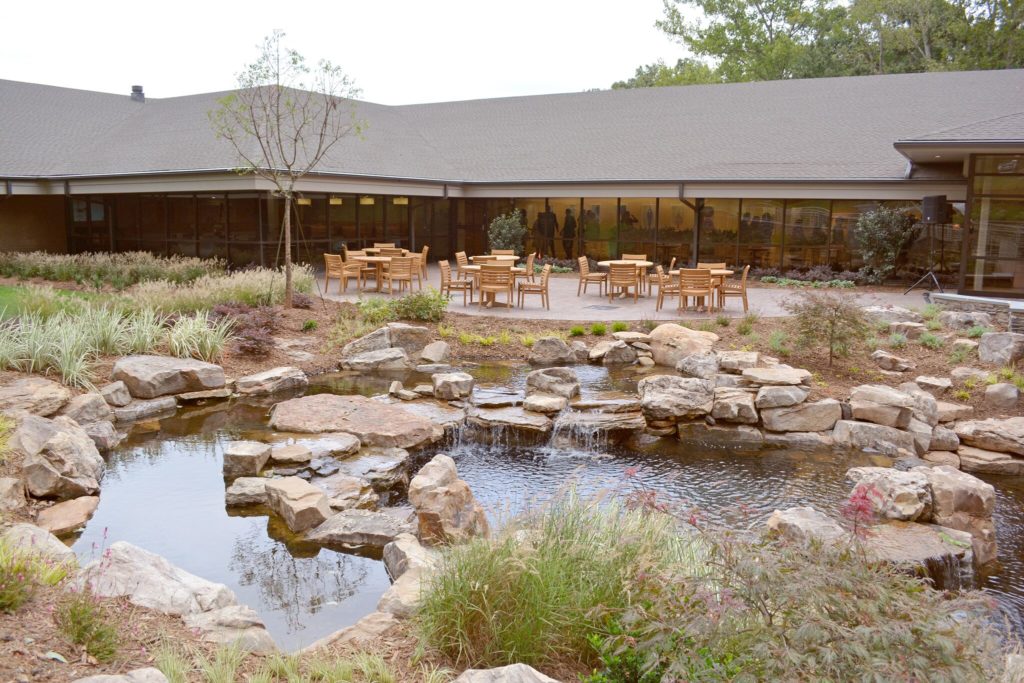
Supporting Mental Health
Supporting Mental Health
A new residential facility in Charlotte, North Carolina, fills a crucial gap in mental health treatment.
Like many good ideas, HopeWay Foundation began with a personal experience and a problem in need of a solution.
The family of Bill and Betsy Blue, like many others, had been profoundly affected by mental illness. Over a seven-year period of trying to gain access to quality treatment in their adopted home of Charlotte, N.C., it became clear there was a gap in the continuum of care. There was no residential, long-term treatment facility between Atlanta and Baltimore.
After the Blues attended a community meeting about the lack of mental health care, they began brainstorming ways to help.
“The particular area (of mental health care) that we noticed that was missing was post-acute care, or preventing an acute situation,” Bill said. “We were disappointed that to get a very therapeutic program, you had to go out of state. We found a program in Atlanta, actually, and thought, ‘Why can’t Charlotte have this type of program?’”
The Blues visited similar facilities in other cities and held numerous conversations and meetings with area stakeholders. The result was the forming of HopeWay Foundation in January 2014 with the goal to broaden the scope of mental health care and education for adults in the region.
“Two years ago, Carolinas Healthcare System created a service line of behavioral health across the entire system,” said John Santopietro, chief clinical officer for behavioral health at Carolinas Healthcare. “That was the first time they had ever organized (in that way). So, there was a silo here and a silo there, doing good work, but they’d never had a place to develop strategy across the system.”
The statistics around mental health are staggering: According to the National Alliance on Mental Illness, 1-in-5 adults will experience mental illness in a given year, while 1-in-25 (10 million) adults live with a serious mental illness. And while studies show that 90 percent of people who receive best practice care demonstrate a reduction of symptoms and improved productivity, 60 percent of adults didn’t receive mental health services in the previous year.
10 million adults live with a serious mental illness.
“Say you have a stroke — you’re in the hospital, and you get released, and you’re sent to rehab,” Betsy Blue said. “What if they tell you at the hospital that in order to be able to go to rehab, you have to go to another state in order to learn how to walk again? You may find a place in Boston or Houston or Atlanta. That’s what mental health care is like.”
With the 230,000 adults currently suffer from serious mental illness within a 100-mile radius of Charlotte in mind – and a vision to help the community — the Blues met with us at Foundation For The Carolinas, one of the largest community foundations in the United States, which Bill calls the “defacto clearing house for all philanthropic activity in our community.”
“Early on in our process, we wanted to visit with the foundation to make sure we weren’t being redundant with any other effort,” Bill added. “And we were encouraged at that point, by the staff, to proceed.”
Our Foundation President and CEO Michael Marsicano advised the group to get a feasibility study to really prove out their model. Bill Blue credited the suggestion to not only helping the group with its board, but it ultimately assisted them with large initial donors. FFTC has also helped with HopeWay’s fundraising efforts through support from some of the donor advised funds it manages. Foundations and families looking to direct their gifts to the healthcare area now know there is an option to support long-term mental health. The Blues — FFTC donor advised fund clients for many years – used part of their DAF assets to fund the project, as well.
The money was needed, as the capital campaign the HopeWay board launched has a goal to raise $25.4 million to build a facility on 12 wooded acres in southwest Charlotte. It will include a 52,675-square-foot educational and residential building with 36 private bedrooms, a full-service kitchen/dining hall, classrooms, administrative offices, a library, walking trails, a 13,800-square-foot gymnasium and two single-family houses for transitional patients.
In addition to the bedrooms, there will be space for treatment of 50 day patients as well. Renovations and construction began in September 2015 with a planned opening in 2016.
In anticipation, HopeWay hired Dr. Alyson Kuroski-Mazzei as the CEO and CMO in February 2016. Her background includes founding the Forensic Psychiatry Program and Clinic at the University of North Carolina School of Medicine in Chapel Hill in 2006, and continuing her work in national forensic psychiatry through UNC-Chapel Hill Psychiatry Department for the next 10 years.

The new HopeWay residential mental health treatment facility recently opened in Charlotte, North Carolina. Photo courtesy of HopeWay Foundation.
Bill Blue stayed on as chairman, a role he has held since co-founding HopeWay Foundation in 2014 and retiring as Vice Chairman of Investing Banking and Capital Markets for Wells Fargo Securities. Betsy Blue is on the board of directors.
For the Blues, HopeWay Foundation has not only been a dream fulfilled but a labor of love. With their vision so close to being completed, they’re eager to get started helping those most in need.
“Our family learned firsthand how challenging it can be to gain access to effective mental healthcare and education,” Bill said. “There is a striking void between acute care hospitals and the doctor’s or therapist’s office. When it comes to mental health, we have been inspired by a quote: ‘It is better to light a small candle than to curse the darkness.’ We want HopeWay to be a beacon of light for mental healthcare and education.”
Holly Welch Stubbing is Executive Vice President at the Foundation For the Carolinas.
Philanthropy
Foundation For the Carolinas
Project
HopeWay


